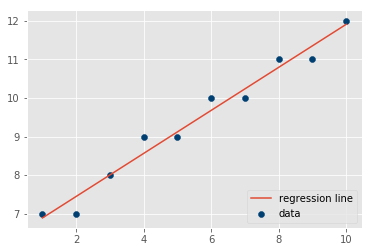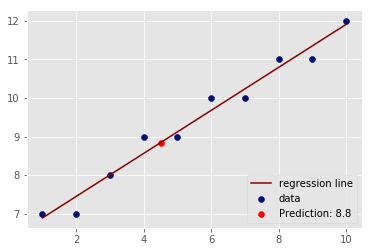By now, you have created all the necessary functions to calculate the slope, intercept, best-fit line, prediction, and visualizations. In this lab you will put them all together to run a regression experiment and calculate the model loss.
You will be able to:
- Perform a linear regression using self-constructed functions
- Calculate the coefficient of determination using self-constructed functions
- Use the coefficient of determination to determine model performance
Slope:
Intercept: $ \hat c = \bar{y} - \hat m\bar{x}$
Prediction:
R-Squared: $ R^2 = 1- \dfrac{SS_{RES}}{SS_{TOT}} = 1 - \dfrac{\sum_i(y_i - \hat y_i)^2}{\sum_i(y_i - \overline y_i)^2} $
Use the Python functions created earlier to implement these formulas to run a regression analysis using x and y as input variables.
# Combine all the functions created so far to run a complete regression experiment.
# Produce an output similar to the one shown below.
X = np.array([1, 2, 3, 4, 5, 6, 7, 8, 9, 10], dtype=np.float64)
Y = np.array([7, 7, 8, 9, 9, 10, 10, 11, 11, 12], dtype=np.float64)# Basic Regression Diagnostics
# ----------------------------
# Slope: 0.56
# Y-Intercept: 6.33
# R-Squared: 0.97
# ----------------------------
# Model: Y = 0.56 * X + 6.33Basic Regression Diagnostics
----------------------------
Slope: 0.56
Y-Intercept: 6.33
R-Squared: 0.97
----------------------------
Model: Y = 0.56 * X + 6.33
Predict and plot the value of y using regression line above for a new value of
# Make prediction for x = 4.5 and visualize on the scatter plotLoad the "heightweight.csv" dataset. Use the height as an independent and weight as a dependent variable and draw a regression line to data using your code above. Calculate your R-Squared value for the model and try to predict new values of y.
In this lab, we ran a complete simple regression analysis experiment using functions created so far. Next up, you'll learn how you can use Python's built-in modules to perform similar analyses with a much higher level of sophistication.

